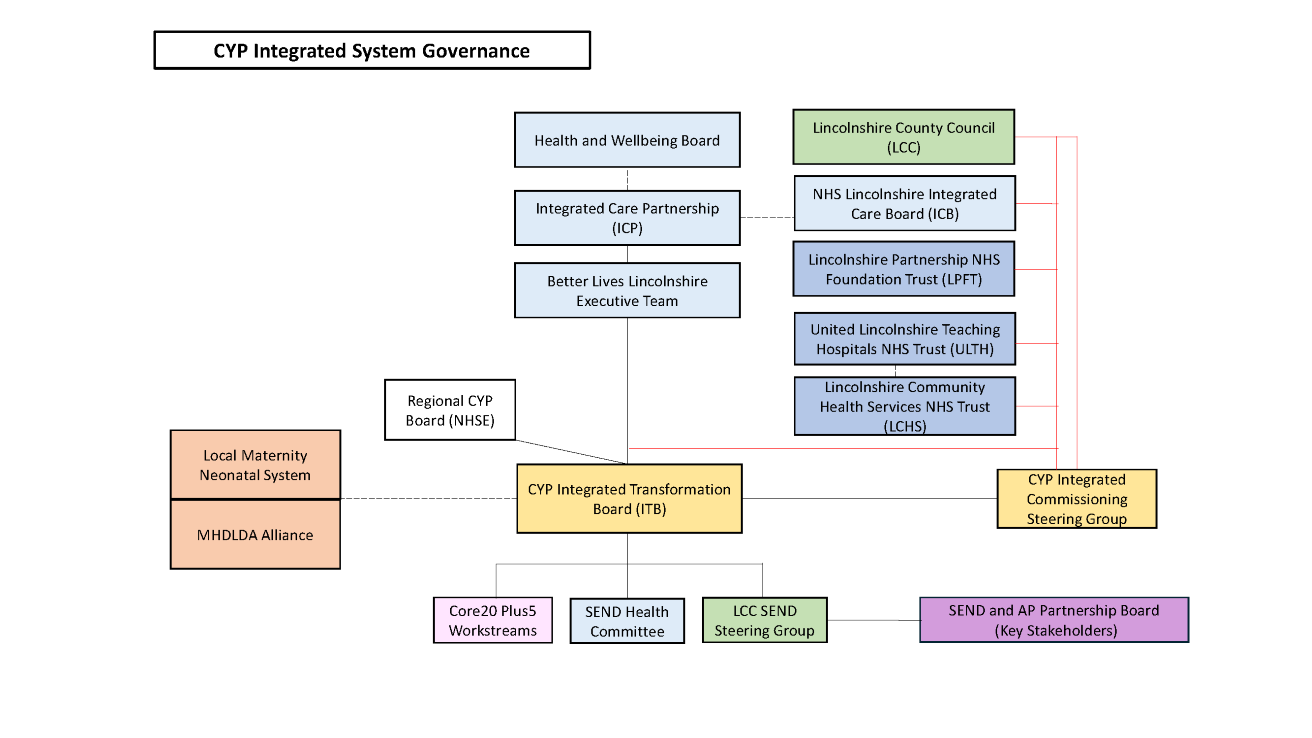Lincolnshire integrated commissioning arrangements for CYP with SEND
The ICP is the primary board advised and governed by the health and wellbeing board with full oversight of the integrated care system alongside the CYP ICB.
The CYP integrated transformation board (ITB) brings together the work of a number of system partners across LCC and NHS, namely: United Lincolnshire Hospital Trust (UHLT), Lincolnshire Partnership Foundation Trust (LPFT), Lincolnshire Community Health Services (LCHS), the CYP integrated commissioning steering group, Core20Plus5, SEND health committee and the SEND steering group, as well as being supported by organisational boards and various system groups working together, covering different aspects of health care services including: Better Lives Lincolnshire executive team, local maternity and neonatal system and the mental health, dementia, learning disability and autism executive group, and the NHSE regional CYP board. SEND and AP partnership board are key stakeholders.
Integrated Care Board (ICB)
The ICB is a statutory body in place since 1st July 2022. Its general function is to arrange provision of services for the purposes of the health service in England in accordance with the Health and Care Act 2022.
Lincolnshire has a board-level executive lead for CYP with SEND, a designated clinical officer (DCO) for SEND since 2017, and an associate DCO since 2019; working in partnership with LCC’s SEND service, supporting the ICB to ensure it performs its functions effectively for CYP with SEND and their families.
The ICB will use its resources and powers to achieve demonstrable progress, collaborating to tackle complex challenges, including:
- improving the health of CYP
- supporting people to stay well and independent
- acting sooner to help those with preventable conditions
- supporting those with long-term conditions or mental health issues
- caring for those with multiple needs as populations age
- getting the best from collective resources so people get care as quickly as possible
CYP Integrated Transformation Board (ITB)
The ITB is co-chaired by the ICB associate director of nursing and quality and the LCC assistant director for children’s health and commissioning.
The purpose of the ITB is to provide strategic oversight of CYP services in Lincolnshire with the aim of transforming pathways across health and care incorporating education.
The board meets bi-monthly and provides strategic oversight of CYP services in Lincolnshire, bringing together representatives from across the system, including those with a lived experience, to jointly plan and prioritise services and support for CYP, and to provide updates on services, work programmes and flag any risks and issues.
All members of the ITB, including the DCO for SEND, children’s head of service for SEND and LPCF, have an equal voice and opportunity to review how current service provision and future planned arrangements could be improved and delivered more efficiently with better outcomes for CYP through improved integrated working.
The ITB in turn, provides updates to NHS England (NHSE) regional group. Formal governance and decision making is in line with each partner’s own decision-making process.
Children’s integrated commissioning team (CICT)
The ICB and LCC jointly fund the CICT. The work of the team is directed by the CYP integrated commissioning steering group co-chaired by ICB deputy director of nursing and quality and LCC head of children’s strategic commissioning.
CICT work is aligned to priorities identified through the ITB. Steering group members come together to:
- determine the scope of jointly agreed projects
- identify cross-cutting interdependencies
- agree timelines
- determine who is responsible for delivery from across ICB, LCC CYP commissioners, or the CICT
The ICB and LCC work closely together to ensure a consistent, countywide commissioning approach thus preventing duplication of work and service delivery.
The work of the CICT is determined by listening to CYP and families, partners, joint strategic discussion, local and national intelligence, and evidence of need reported within up-to-date local strategies including:
- NHS CYP work programme 2023-2028
- joint forward plan - Lincolnshire ICB
- Lincolnshire local transformation plan for CYP emotional wellbeing and mental health
- joint health and wellbeing strategy for Lincolnshire
- joint strategic needs assessment (JSNA) - Lincolnshire health intelligence hub
- participation strategy 2023-26
- integrated care partnership – Lincolnshire County Council
- social care sufficiency strategy
- Lincolnshire's inclusion plan
- autism strategy. (owned by Lincolnshire Autism Parnership Board)
- Lincolnshire children's services market position statement 2024-25


